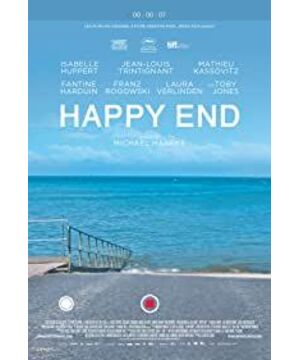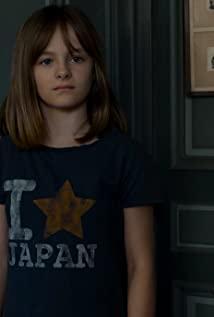Ten years ago, "Internet addiction" was still a disease
To be sent to an addiction center for closed treatment
No one mentions this in ten years
Because since the popularity of smartphones, everyone has become an Internet addict
Up to 80 years old, down to 8 months
Everyone's mobile phone is full of various live broadcast and short video apps
A day without video media seems so empty that there is nowhere to spend time
So we all became marionettes in the hands of the media
Cannes Film Festival regular Michael Haneke
(representative works "Love", "Piano Teacher", etc.)
This time he took aim at the phenomenon
Replacing the camera with the phone's rear lens
stand as a bystander
Calmly and restrained to show the audience a
European middle class "exquisite ugly life"
Affectionate estrangement
The film begins with a set of live footage:
A woman is finishing her bedtime preparations; a small hamster dies in a cage after eating food mixed with depressive drugs; the woman lies motionless on the sofa, and the recorder begins to think whether she needs to call an ambulance...
Obviously they are from the same recorder, and the caption of the picture directly conveys TA's feelings for her mother, in two words: disgust.
She was so disgusted that she didn't hesitate to experiment with pets, and eventually drugged her mother to become a vegetative state.
The girl with the face of an angel has a devil in her heart.
Haneke, however, said her indifference was not groundless. He gave us a further peek inside the family.
The girl was taken to her father's house. From the estranged position of the father and daughter, it was immediately concluded that they had not seen each other for a long time. The dogs in the house did not recognize the girl.
In further getting along, the girl discovered all kinds of bad deeds of her father.
For example, just after having a son with his second wife, he chatted with his lover on the Internet; he ignored his daughter and answered his lover's phone call; at a family gathering, he even invited his lover to his home to perform, pretending that the two met for the first time.
Between the shots, a "hypocritical" label was attached to this middle-class family.
love or interest
Keep digging deeper into the rest of the family.
Famous movie star Isabelle Huber plays the little girl's aunt and heir to the family business of this middle-class family. She shoulders the mission of revitalizing her family business, but unfortunately her career is declining day by day, and she has also encountered heavy losses such as a construction site accident.
And her only heir, her son, was unable to shoulder the burden of supporting the family.
In the middle of the night, she came to her son's residence and firstly taught him how he failed to take care of his official duties, and then she turned into a mother and tried to give her son a warm embrace.
The son resisted, and he begged Hubert angrily to stop pretending .
In desperation, Yu Bell had to continue to take the lead and found a banker boyfriend to solve the company's loan difficulties.
When the loan was finally approved, Hubert breathed a sigh of relief. She took the initiative to hold her boyfriend's hand as she walked out of the office, a tiny gesture that seemed to be out of gratitude.
It's hard to say whether this marriage is driven by love or profit. Haneke leaves the answer to the audience's choice.
race and class
The refugee issue has been hotly debated in Europe recently, and Haneke, who is approaching old age, still keeps up with the trend.
The middle-class families with this problem have had relationships with blacks three times successively, and the three times have conveyed different levels of signals.
For the first time, the grandfather in the family was begging for death, he went out to find a group of black guys for help, and took off his watch in exchange for it. Just when the boy was confused, an old white man came to intervene, and seemed to imagine this scene as a robbery.
The second time, the dog in the family bit the servant's daughter. The mother's beloved daughter sincerely blamed the owner, but the father's eyes were worried, for fear of affecting his errand's livelihood.
The third time, Hubert's son brought a group of black people to make a big noise at his mother's engagement banquet. In this beautiful restaurant full of Caucasians, the darkness in the corner, like a mouse poop, disturbed the guests' appetite for dining.
In Europe, a land that is still proud of its white skin, the living conditions of black people or refugees are difficult, they are wronged and accommodated , and they are often maliciously speculated .
And those white guys who claim to be free, equal, and democratic can only pretend to accept the "difficult brothers and sisters" of the third world in an inclusive manner.
"Pretend" is the central vocabulary of the family and the collective face of the entire European middle class.
Reluctantly maintain a separated family relationship, because there is only self in my heart;
Sacrifice emotion for capital, distort the boundaries between love and money;
The self-proclaimed chosen people of God, on stilts, compete with other "inferior peoples"...
It was in response to the sentence that he refused to admit it, but his body was very honest. Today's European middle class is moving towards a split personality step by step, and they even believe in themselves after pretending for a long time.
This is why grandfathers look for opportunities to commit suicide in their old age, when they should be enjoying their years. I couldn't kill myself by driving, I couldn't get help from a hairdresser, I couldn't find a black guy, and finally I found my granddaughter...
It was through all the bourgeois dilemmas his sons and daughters were going through that he felt exhausted and exhausted, and was no longer willing to continue to pretend .
blank lens language
It is not easy to deeply appreciate "Happy Ending". Its too-fine clues are buried in sections of seemingly unconnected pictures, waiting for the audience to dig out like a puzzle .
For example, the father's cheating object is not specifically explained in the film, but a set of positive and negative fights at a family party are used to show the two people's warm gaze.
The fact that the daughter murdered her mother did not give a clear explanation, but the girl mentioned words such as "depression" and "drug" when she was interviewed outside the ICU.
It is so obscure that audiences who encounter this film for the first time often have a feeling similar to a jigsaw puzzle, looking for the correlations from paragraphs of narrative, which is also Haneke's consistent video style.
Its decomposed narrative method coincides with the habit of reading short videos in today 's media fast food era, and it is always difficult to enter a story quietly and immersively.
Inside and outside the film, from the form to the content, is a deep ridicule of the middle class.
While you are still swiping other people's joys and sorrows on your fingers, Haneke has made your life into a movie.
Scan QR code
Learn More Happy Ending Secrets
View more about Happy End reviews











